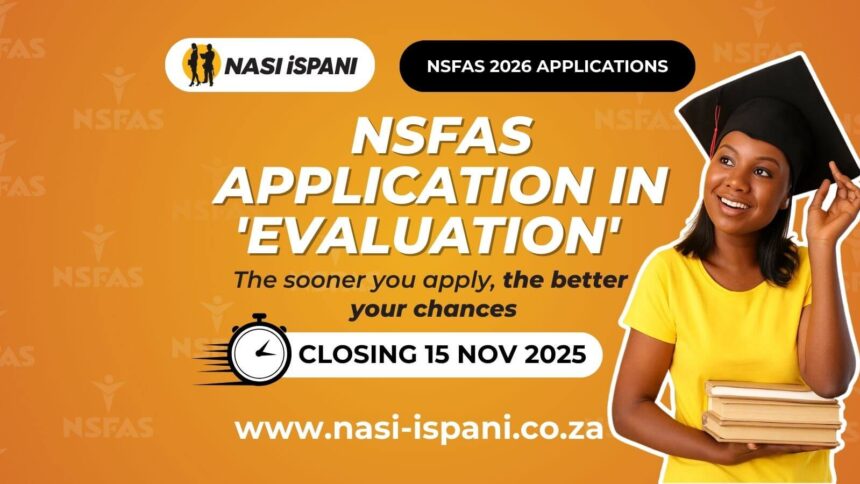Many South African students applying for NSFAS funding find themselves anxiously checking their myNSFAS portal — only to see the word “Evaluation” for weeks or even months. If this is you, you’re not alone. This stage can feel frustrating, but it’s also normal. Below we’ll break down exactly what “Evaluation” means, why applications get stuck there, and what you can do to move forward.
Understanding the NSFAS Application Process
NSFAS follows a series of steps to determine who qualifies for funding. Knowing these stages can help you track where your application is:
- Submitted – Your application has been received.
- Evaluation – NSFAS is verifying your information.
- Funding Eligibility – They check your household income and other criteria.
- Awaiting Academic Results/Institution – NSFAS waits for confirmation from your university or TVET college.
- Provisionally Funded – You meet the criteria but final confirmation is pending.
- Approved/Rejected – Final decision on your funding.
When your status says “Evaluation,” NSFAS is actively verifying your personal details, financial information, and supporting documents. This includes cross-checking your ID, household income, and other information with external government systems like Home Affairs, SARS, and SASSA.
Why Applications Get Stuck in “Evaluation”
Even though “Evaluation” is normal, several issues can slow your progress:
1. High Volume of Applications
Each year, hundreds of thousands of students apply for NSFAS. This creates natural delays in processing.
2. Verification Bottlenecks
Your information must be matched with government databases. If there’s a mismatch — for example, your ID number or income details differ between documents — the system may pause your evaluation.
3. Incomplete or Unclear Documents
Blurry uploads, missing pages, or uncertified documents often trigger manual reviews, which take longer.
4. Technical Errors on the myNSFAS Portal
Occasionally, glitches on the portal can freeze your application status.
5. Special Cases
Students applying for disability allowances, guardianship, or foster care benefits may require additional checks and approvals.
What to Do If Your NSFAS Application Is Stuck in “Evaluation”
Here’s a practical step-by-step guide to help you handle a delayed application:
Step 1: Be Patient (Know the Timelines)
The evaluation stage can last anywhere from a few weeks to a few months, especially during peak application periods. Check NSFAS’s official communications for deadlines and processing updates.
Step 2: Regularly Check Your myNSFAS Portal
Log in frequently to monitor progress. Watch for requests for additional documents or notices that something needs to be corrected.
Step 3: Verify Your Documents
Double-check that all uploaded documents are:
- Clear and legible.
- Certified copies (signed and stamped within the last three months).
- Up to date (e.g., correct household income proof).
If you spot an error, re-upload the corrected document on the portal as soon as possible.
Step 4: Contact NSFAS Directly
If your application has been stuck for an unusually long time, reach out to NSFAS. Be sure to have your ID number and application reference number handy.
Contact Details:
- Toll-Free Number: 0800 067 327
- Email: info@nsfas.org.za
- Twitter (X): @myNSFAS
- Facebook: National Student Financial Aid Scheme
When you log a query, NSFAS will provide a reference number — keep this for future follow-ups.
Step 5: Visit Your University or TVET Financial Aid Office
Sometimes your institution’s financial aid office can escalate unresolved NSFAS issues internally. Bring your ID, student number, and NSFAS reference number.
Step 6: Prepare for an Appeal (if necessary)
If your evaluation ends in a rejection, don’t panic — NSFAS allows appeals.
Strengthen your appeal with:
- Updated income affidavits.
- Guardianship or foster care affidavits.
- Disability support documents, if applicable.
Proactive Tips to Avoid Long Delays in Future
- Apply early in the NSFAS cycle to get ahead of bottlenecks.
- Keep certified copies of all key documents in a safe place.
- Double-check your spelling and personal details before submitting.
- Save your application reference number immediately after applying.
- Use a stable internet connection when uploading documents to avoid corrupt files.
Read more: NSFAS 2026 for First-Time Applicants vs Returning Students
Frequently Asked Questions (FAQs)
1. How long should NSFAS evaluation take?
Typically, evaluation can take several weeks, but during peak periods it can stretch to a few months.
2. Can I update my application while it’s still in evaluation?
Yes, you can re-upload updated or corrected documents directly on the myNSFAS portal if requested.
3. What if my status hasn’t changed for months?
If it’s been more than two to three months with no updates, contact NSFAS and log a formal query with your reference number.
4. Can my application be rejected after “Evaluation”?
Yes, if NSFAS finds that you don’t meet financial or academic eligibility criteria, they may reject the application after evaluation.
5. Who do I contact if NSFAS doesn’t respond?
Start with NSFAS customer care, then follow up with your institution’s financial aid office if needed.
6. Why does NSFAS need to verify my information with Home Affairs, SARS, and SASSA?
NSFAS cross-checks your ID, household income, and social grant details with these government departments to ensure your eligibility and prevent fraud.
7. Can I apply for NSFAS again if my application stays stuck or is rejected?
Yes. You can reapply during the next NSFAS application cycle if your situation changes or you were rejected previously.
8. How do I know if NSFAS has received my documents correctly?
After uploading, check your myNSFAS portal for a confirmation message or email. If your documents aren’t listed as received, re-upload them or contact NSFAS.
9. Does NSFAS fund students while the application is still in “Evaluation”?
No. NSFAS only releases funding once your application moves beyond the evaluation stage and you’re approved or provisionally funded.
10. Can my institution speed up my NSFAS evaluation?
In some cases, yes. Your financial aid office can escalate unresolved issues or confirm your academic information directly to NSFAS.
Also check: How to Upload NSFAS Supporting Documents
Seeing “Evaluation” on your NSFAS status isn’t a rejection — it’s a normal part of the verification process. While delays can be frustrating, staying patient, proactive, and informed can make a big difference.
For more guides on navigating NSFAS, check out Nasi iSpani’s NSFAS 2026 series — including tips on supporting documents, reasons applications get rejected, and how to appeal.



